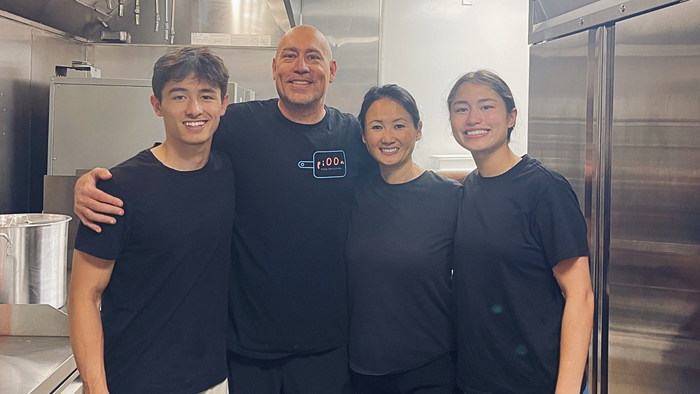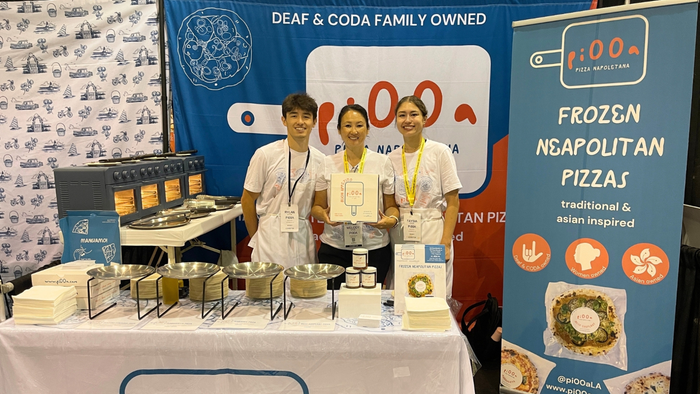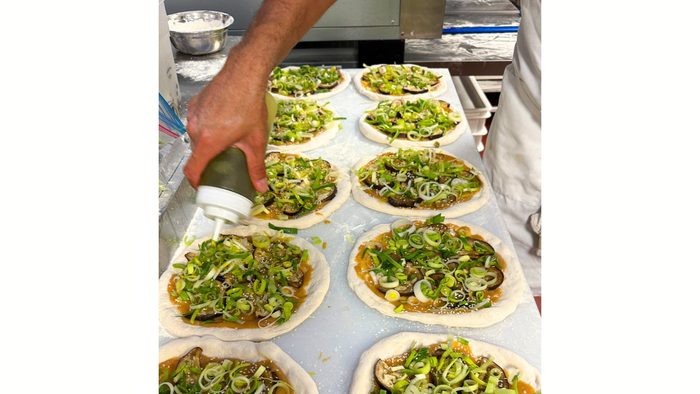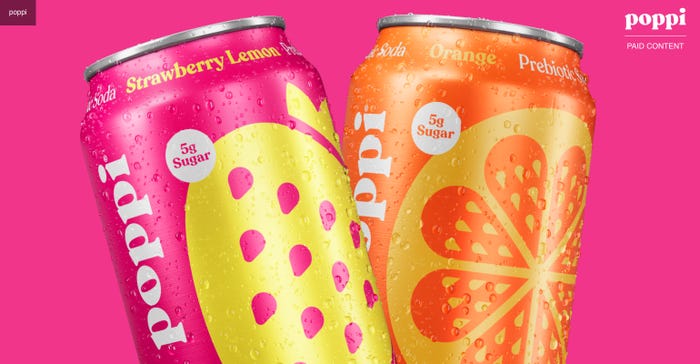Frozen pizza brand Pi00a supports Deaf community through employmentFrozen pizza brand Pi00a supports Deaf community through employment
Family-owned Pi00a aims to change how the Deaf community is viewed, one Asian-inspired Neapolitan pizza at a time. Find out how they operate.
October 22, 2024

At a Glance
- Food businesses wouldn't hire Melody Stein because she is deaf. So she became a food entrepreneur.
- After closing their restaurant, the Stein family began making frozen, Asian-inspired, Neapolitan pizzas.
- At Newtopia Now, New Hope editors chose Pi00a as one of four finalists for the 2025 Expo West NEXTY Awards.
Melody Stein, co-founder of Pi00a, a mission-based frozen pizza manufacturing business, wants others to know that it’s not that difficult to employ a deaf person.
But it’s extremely challenging to find a job if you are deaf.
“I remember when I was 16 years old, I really wanted to work in an ice cream shop,” says Stein, who is deaf and uses American Sign Language to communicate with others. For her interview with New Hope, Stein's daughter, Taysia, served as an ASL interpreter.
After noticing a “Help Wanted” sign, Stein told the business she wanted to work there. “I’d written that down,” Stein says. “I told them I was deaf. But they said no and weren’t interested in me.”
The same thing happened to Stein when she applied to culinary schools in 1993.
“They rejected me simply because I was deaf,” she says.
Stein says that happens a lot. After struggling to find someone who would train or hire her, Stein created her own path as a serial entrepreneur.
“I really wanted to work in food industry, but there were no chances. I tried in a lot of places. It was a huge obstacle for me and barrier,” says Stein, whose children, Tasyia and Rylan, are considered Children Of Deaf Adults (CODA).

From left, Rylan, Russ, Melody and Tasyia Stein worked together to open Pi00a, which makes Asian-fusion frozen pizzas and supports the Deaf community.
In 2023, Stein, her husband, Russ, and her children created TMRR Foods LLC—an acronym representing the first letter of their first names—and did a major pivot.
Instead of working in the restaurant industry, the family began making frozen, Asian-inspired, Neapolitan pizzas as a family-run company called Pi00a. Pronounced “pie-oh-ah,” Pi00a takes its name from the "00" flour used for Neapolitan-style pizza while focusing on an incredible mission: increasing accessibility and including deaf people in all aspects of the business, while providing continual accessibility training for staff members.
“It’s about hiring deaf people to create job opportunities,” Stein says, “because I myself have witnessed and experienced the same thing and have struggled to find jobs.”

From left, Rylan, Melody and Tasyia Stein pose at their Newtopia Now booth, where they made pizzas for thousands of people.
Looking to expand her network, Stein attended Newtopia Now, New Hope Network’s new trade show, which debuted in August at the Colorado Convention Center.
“It was a wonderful experience,” Stein says. “We didn't know what to expect, since it was a new trade show, and it was only our second trade show ever. We had an open mind about everything.”
“The difference was there was a lot more intimate, in-depth conversations with retailers, buyers and distributors,” Stein adds. “It was a nice way to have interactions because it felt more personal, like we actually made that connection.”
At the show, she found out her deaf-owned and operated company is one of four finalists chosen as a finalist for the 2025 Expo West NEXTY Awards.
“It’s such a big deal,” Stein says. “We are really excited and hope this will help open doors for us. We are start-up and struggling to grow. We have some deaf individuals who want jobs but we’re not ready to hire yet.”
Currently, Stein and family operate Pi00a with three outside employees. With her husband doing the bookkeeping, six people are in the kitchen.
“We’re capable of making around 300 pizzas a day,” she says.
Last year, Pi00a started as a delivery-based brand. “But we weren’t very visible, and it was pretty hard,” she says. “Now we’ve completely changed into a [self] manufacturing mode.”
To transition, Stein operates Pi00a inside a 300-square-foot rented kitchen space at Amped Kitchens in Los Angeles.
“Our previous kitchen was just 200 square feet,” she says. “That 100 square feet feels like a big difference. We now have a co-working space to work on our computers. They have a walk-in freezer, so we didn’t need to buy more equipment.”
Pi00a, which sells eight varieties of pizza, offers direct-to-consumer shipping off their website within the 48 continental states. They also sell frozen pizzas in California retailers like LA Homefarm, McCall’s Meat and Fish Co. and Minik Market as well as select locations around the country like Mixed Pantry in Seattle, Washington, and Maya Congee Cafe in Brooklyn, New York.
“We're looking for angel investors,” Stein says. “We're in the seed stage and looking to raise $500,000 to a million [dollars] to help us with operations and marketing.”

At Newtopia Now, Melody Stein's miso-eggplant pizza was chosen as a finalist for the 2025 Expo West NEXTY Awards.
Creating Asian-Italian fusion pizza
One of Pi00a’s most popular pizzas is its Miso Eggplant option, an Asian-inspired, vegan Neapolitan pizza.
Born in Hong Kong, Stein and her family moved to the Philippines and Singapore, searching for deaf schools in different countries, before coming to the U.S. in the 1980s. “My parents didn’t know I was deaf until my grandmother noticed I wasn’t responding to any noise. I was 2 years old,” says Stein, whose younger brother was also born deaf.
When Stein started her latest business, she wanted to meld her love of Asian food with Neapolitan Pizza.
“I grew up eating a lot of Asian food. I really love it, and Italian food too,” Stein says. “I see a lot more fusion, global tastes in food. I always see pizza dough like a canvas. You can make something beautiful and represent different cultures in this one food.”
That’s also true when creating a more inclusive workspace.
“When you’re interviewing someone, get an interpreter so they can perform well,” Stein says. “Otherwise, you’ll experience communication barriers.” The same is true once a hire is made, she says. Get an interpreter, which can be considered a business expense, Stein says, so employees know what to expect at the workspace, meeting the team and setting a good introduction.
Use a whiteboard. “It’s easier for deaf individuals to see and hear people communicate if you just write down on a whiteboard immediately,” she says. “And learn basic signs.”
In a restaurant when someone would come up and ask how long a dish would take to finish. “We would simply say five minutes,” she says, holding up one hand with five fingers displayed.
“Some people are paranoid about carrying knives or hot soup,” she says. “I always teach people to tap on the shoulder or with your arm or leg, just to notify them to move. Push more so they know you’re right behind you. There are ways to develop more internal communication so it’s a good workspace that’s safe.”
With such systems, Pi00a has transitioned into a “communication barrier-less space,” a quiet kitchen. While Tasha and Rylan can hear and speak, when they come to work, they don’t use their voices.
“We use sign language to communicate with everyone,” Stein says. “It’s a communication barrier-less space that’s 100% accessible with American Sign Language versus working with other companies out there.”
“It's hard to grow as a deaf individual,” Stein says. “And here you can thrive and communicate. That's what we want to emphasize.”
Stein’s journey into creating a family food business began after she met her future husband, Russ, a Child of Deaf Adults, at Gallaudet University, the nation’s only liberal arts school for the deaf, located in Washington, D.C.
Both wanted to open a restaurant.
Russ, a native of the Empire State, wanted to do New York-style pizza. Stein’s dream restaurant included a nice wine bar. “New York-style pizza didn’t really fit,” she says.
Instead, they decided to compromise.
The couple were out on a date in San Francisco, California, when Stein discovered Neapolitan pizza. “They brought out a pizza that didn’t look like a New York-style pizza,” she says. “And I fell in love with it. I loved the taste and the look.”
“I told Russ, this is exactly what I want,” Stein says. “Russ was hesitant, so I had to go to Italy.”
Through private culinary classes in Italy, Stein learned the art of making Neapolitan pizza. “I brought my mom who helped interpret for me,” Stein says. “It was easier for me to learn in a private class versus with other students talking too much. I would lose focus.”
When Stein returned, she made a delicious pizza for her husband, and he was hooked.
“I won him over,” she says.
In 2011, Melody and Russ founded Mozzeria, a Neapolitan pizza and small-plates restaurant in San Francisco's Mission District, later becoming the first deaf professional pizza makers to be certified Associazione Verace Pizza Napoletana (AVPN). Later, two food trucks were added to the business. In 2017, they sold the entire brand, Mozzeria and the food trucks, to Communication Services for the Deaf, a nonprofit.
“So, this is a completely different business,” Stein says.
Now that she’s no longer running a restaurant, Stein is only focused on the back of the house. “We don’t have to worry about plates, decoration. It’s very simple,” she says. “It’s about the kitchen and making the best pizzas very well.”
To learn more about Natural Products Expo West, which will be March 4-7, 2025, at the Anaheim Convention Center in Anaheim, California, click here. To get the best badge pricing, register now.
About the Author
You May Also Like





